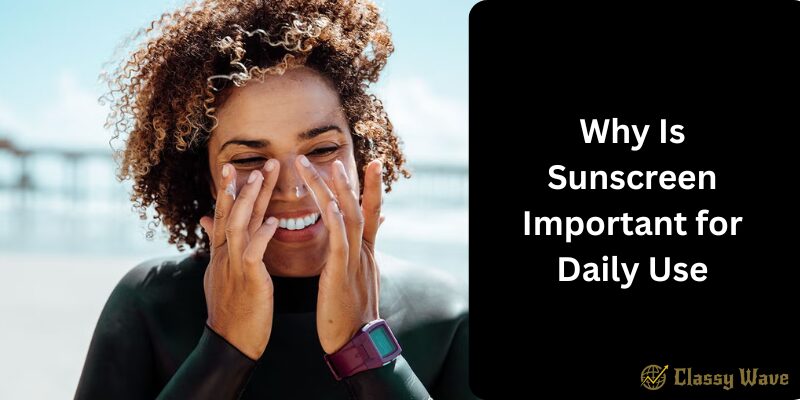Why Is Sunscreen Important for Daily Use | Classy Wave
Sunscreen isn’t just for beach days or summer vacations—it’s a vital part of your everyday skincare routine. Whether it’s sunny, cloudy, or even raining, the sun’s UV rays can still reach your skin and cause long-term damage. Many people underestimate the importance of daily sunscreen use, but it plays a huge role in maintaining youthful, healthy, and protected skin.
Understanding UV Rays
What Are UV Rays?
UV (ultraviolet) rays are invisible rays from the sun that can harm your skin. There are two main types:
- UVA rays: Penetrate deep into the skin, causing aging and wrinkles.
- UVB rays: Affect the outer layer, leading to sunburn and skin redness.
How UV Rays Affect Your Skin
Even short-term exposure without protection can cause sunburn, while long-term exposure leads to premature aging, dark spots, and increased risk of skin cancer.
Top Reasons Sunscreen Should Be Part of Your Daily Routine
1. Prevents Premature Aging
No one wants wrinkles or fine lines earlier than necessary. UV exposure is one of the top causes of premature skin aging. Using sunscreen daily helps preserve your skin’s elasticity and smoothness.
2. Reduces the Risk of Skin Cancer
Skin cancer is one of the most common forms of cancer worldwide. Regular sunscreen use is scientifically proven to reduce your risk by blocking harmful UV rays.
3. Protects Against Sunburn
Sunburn isn’t just uncomfortable—it damages skin cells and increases your chances of future complications. Even mild sunburns can cause long-term harm.
4. Prevents Uneven Skin Tone
Freckles, dark spots, and pigmentation are often the result of sun exposure. Sunscreen helps maintain an even, radiant complexion by protecting against sun-induced discoloration.
5. Works in All Seasons
Even in winter or cloudy weather, UV rays can penetrate through clouds and windows. Applying sunscreen daily ensures continuous protection, no matter the season.
Choosing the Right Sunscreen
1. Check the SPF
SPF (Sun Protection Factor) measures how well a sunscreen protects against UVB rays.
- SPF 30: Blocks about 97% of UVB rays.
- SPF 50: Blocks about 98% of UVB rays.
Choose SPF 30 or higher for daily use.
2. Go for Broad-Spectrum Protection
Ensure your sunscreen protects against both UVA and UVB rays. Broad-spectrum formulas are ideal for complete skin protection.
3. Consider Your Skin Type
- Oily skin: Use oil-free or gel-based sunscreens.
- Dry skin: Look for moisturizing formulas with ingredients like hyaluronic acid or glycerin.
- Sensitive skin: Choose mineral sunscreens with zinc oxide or titanium dioxide.
4. Water-Resistant Formulas
If you sweat or swim, water-resistant sunscreens are essential. However, remember to reapply every 2 hours for continued protection.
How to Apply Sunscreen Properly
Step 1: Apply Enough Product
Most people don’t use enough sunscreen. You need about a nickel-sized amount for your face and a shot-glass-sized amount for your body.
Step 2: Apply Before Sun Exposure
Apply sunscreen 15-20 minutes before going outdoors to allow it to absorb into your skin.
Step 3: Don’t Forget Key Areas
People often forget:
- Ears
- Neck
- Back of hands
- Feet
- Lips (use SPF lip balm)
Step 4: Reapply Regularly
Reapply sunscreen every two hours, or immediately after swimming or sweating.
Common Myths About Sunscreen
Myth 1: I Don’t Need Sunscreen Indoors
False! UVA rays can penetrate through windows, meaning you’re still at risk inside.
Myth 2: Dark Skin Doesn’t Need Sunscreen
Everyone, regardless of skin tone, is susceptible to UV damage. Melanin offers some protection but not enough to block all harmful rays.
Myth 3: Makeup with SPF Is Enough
While helpful, makeup SPF isn’t enough protection for the entire day. Always apply regular sunscreen beneath your makeup.
Myth 4: Sunscreen Causes Vitamin D Deficiency
You can still get enough vitamin D while wearing sunscreen. A few minutes of indirect sunlight daily is sufficient.
Benefits of Daily Sunscreen Use
- Keeps your skin youthful and radiant.
- Reduces hyperpigmentation and dark spots.
- Prevents painful sunburns.
- Boosts skin confidence.
- Acts as a base for makeup for a smooth finish.
Environmental Impact of Sunscreen
Some sunscreens contain chemicals harmful to marine life. Choose reef-safe sunscreens labeled as oxybenzone- and octinoxate-free to protect both your skin and the planet.
Conclusion
Using sunscreen every day is one of the simplest yet most powerful steps you can take for healthy skin. It’s your skin’s shield against premature aging, sunburn, and even cancer. Whether you’re spending the day indoors or outdoors, applying sunscreen should be as routine as brushing your teeth. Protect your skin today—your future self will thank you.

